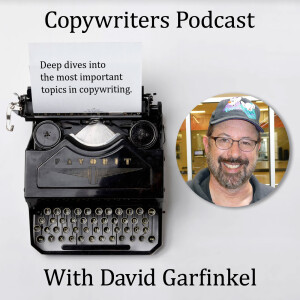
Today’s show is important for everyone involved in copy. It’s especially important for the big thinkers, the visionaries, the big-picture people. We’re going to talk about a subject that makes some people quake in their boots. And that subject is details. They are not as easy to deal with for some people as they are for others. Details do not seem as important as The Big Idea to a lot of marketers and copywriters. And listen to what people say about details. The famous architect, Mies van Der Rohe, said “God is in the details.” He also said, “Each material has its specific characteristics which we must understand if we want to use it. This is no less true of steel and concrete.” So you can see he was really into details himself. Then there’s the famous saying people say a lot on TV and in movies, and also every day in real life. That saying is: “The devil is in the details.” So right there, we have details spanning the moral spectrum from God to the devil. Clearly, they are important. But the question remains: Are they good or are they bad? And how about this saying: “Don’t sweat the small stuff. And it’s all small stuff.” Hmmm. Sounds like they’re talking about details there, too. This applies to copy because we have a natural bias against details. In this way: We are about things that are dramatic and exciting. We like to make big promises. We are seeking to guide emotions in a powerful way. And think about it. A headline like “The important difference between black and tortoise-shell plastic barrettes from Dollar Tree” just wouldn’t cut it. Or… would it? We explored this today. I wanted to put this together because of a conversation I had with a client who had nothing but glowing testimonials and over-the-top claims on a sales page. The person I was talking with was very successful personally, and had a very successful business. But I quickly realized he was leaving a lot of money on the table because there might be a couple of problems for some prospects: • Credibility • Identification Now there’s always tension between awesome excellence (which may be the God’s honest truth about your product, your personal story, and the results people eventually get working with you or using your product) and the everyday life your prospects are now living. The emotional part of your prospect, the part that dreams, wants to think big. Loves to imagine wild, wonderful, luxurious scenarios in the future. But, the rational part of your prospect needs to confirm that what they are reading, or have recently read, isn’t a just scam and a waste of their money. This is where credibility and identification come in. At least some part of your copy, to perform at its best, needs to be credible to your prospect. That mean, from a practical point of view, talking about things they are familiar with in their real world. Right now. Not in the future. Identification comes in when the prospect can see themself right now in some way in your copy. Maybe in the before part of a before-and-after testimonial. Maybe in a description of an ordinary person struggling with the same problem your prospect struggles with. Maybe in a bullet point that talks about improving something specific in their current life. Resolving the tension between over-the-top and the mundane stuff of the real world requires delving into the nitty-gritty. That is, details. A related tension that causes us problems in our copy is the tension between the grandeur of the big picture—walking on the beach at sunset in some exotic tropical location—and the unglamorous detailed experience of the prospect’s daily life—the embarrassment and discomfort of toenail fungus. Both are about feet, right? Walking, and toenails. Now you might or might not mention both things in the same promo, much less in the same sentence like I just did. But being able to shift lenses, so to speak—to go from the wide shot on the beach to the close up of the toenail—is more important and useful a lot more often than you might think. We talked about how the nitty-gritty fits into testimonials and case studies, bullet points, and other parts of copy, and why you can’t ignore it, even if it doesn’t seem that important to you. Because it is important to your prospects. Links: Copy review sessions with me https://www.garfinkelcoaching.com/copy-critiques/ Stealing Fire From The Gods, by Jim Bonnett https://www.amazon.com/Stealing-Fire-Gods-Complete-Filmmakers-ebook/dp/B003FQM2SE Rocket Fuel, by Gino Wickman and Mark C. Winters https://www.amazon.com/Rocket-Fuel-Essential-Combination-Business-ebook/dp/B00U27BMSK
Download.
More Episodes
Secret Lead Magnet Formula
 2024-10-28
2024-10-28
 2024-10-28
2024-10-28
Cult Building and Copywriting
 2024-10-14
2024-10-14
 2024-10-14
2024-10-14
How To Find The Elusive Hidden Benefit
 2024-10-07
2024-10-07
 2024-10-07
2024-10-07
The South Park Copywriting Secret
 2024-09-23
2024-09-23
 2024-09-23
2024-09-23
New Ways To Use FAQs
 2024-09-16
2024-09-16
 2024-09-16
2024-09-16
Secrets For Editing Your Copy
 2024-09-09
2024-09-09
 2024-09-09
2024-09-09
4 Seasons Of Copywriting
 2024-08-12
2024-08-12
 2024-08-12
2024-08-12
Confidence in Copywriting
 2024-08-05
2024-08-05
 2024-08-05
2024-08-05
Copywriting to Prospects with Money
 2024-07-22
2024-07-22
 2024-07-22
2024-07-22
Transformation Stories That Convert
 2024-07-15
2024-07-15
 2024-07-15
2024-07-15
Stories That Predict The Future
 2024-07-01
2024-07-01
 2024-07-01
2024-07-01
012345678910111213141516171819
Create your
podcast in
minutes
- Full-featured podcast site
- Unlimited storage and bandwidth
- Comprehensive podcast stats
- Distribute to Apple Podcasts, Spotify, and more
- Make money with your podcast
It is Free
- Privacy Policy
- Cookie Policy
- Terms of Use
- Consent Preferences
- Copyright © 2015-2024 Podbean.com





